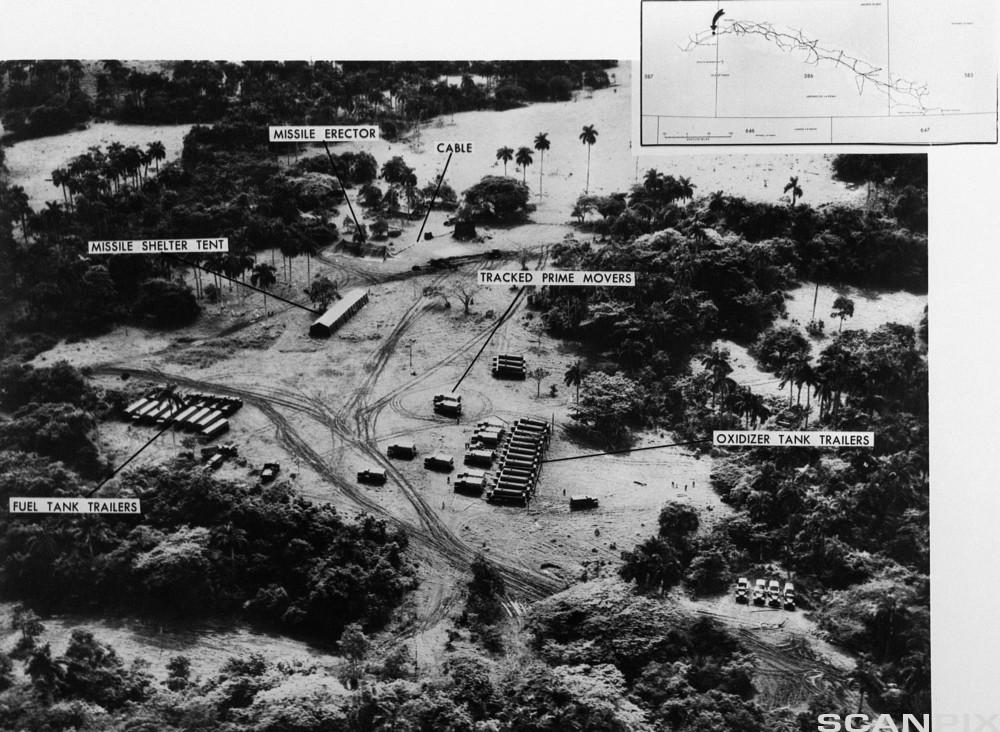
The US and the rest of the world could follow the Russian ships with the missiles hour by hour, day by day, as they were approaching Cuba. The television, which gradually had become publicly accessible in the USA and Europe in the early 60s, added a new dimension in the news coverage. The crisis was solved after two nerve-wracking weeks when Kennedy struck a deal with the Soviet Prime Minister, Nikita Khrusjtsjov. The world has never – before or since – been closer to a nuclear war.
Video Lecture
Khan Academy has made a video lecture on the Cuban Missile Crisis. Listen to the lecture and take notes.
Tasks
A.
Enter the site John F Kennedy and the Cuban Missile Crisis. Read the article and answer the questions.
- What events initiated the Cuban Missile Crisis?
- What was ExComm?
- Kennedy and his staff discussed different options to dealing with the conflict. Mention some of them. What was the final result of their discussion?
- In the article a parallel conflict in Germany is mentioned. Why are the two conflicts interconnected?
- What happened on the 22nd of October?
- On the 26th of October, Kennedy received a message from Khrushchev. What was his demand?
- John F. Kennedy’s brother Robert Kennedy played an important role during the crisis. In what way?
B.
Choose at least 3 of the people below and find out more about who they were and what role they played during the crisis.
McGeorge Bundy, Nikita Khrushchev, Fidel Castro, Robert Kennedy, Theodore Sorensen, C Douglas Dillon, Dean Acheson, Llewllyn Thompson, Robert McNamara, Lyndon B. Johnson, Anatoly Dobrynin
After studying the roles these characters played, make out fictional conversations that might have taken places during the Crisis. Choose two opposing characters (e.g. Khrushchev vs. Sorensen), make a few lines that characterize their rhetorical contributions in the Crisis and act out their conversation.
C.
On Monday, the 22nd of October, Kennedy held a televised speech where he informed the nation about the conflict and the possible outcome. Listen to the first 8 minutes of the speech before you discuss the questions below.
Discuss
- What was the political situation between the US and the USSR before the Crisis started?
- In what way does Kennedy convey the seriousness of the situation? (language, voice, presented facts, his appearance on TV, etc.)
- How does Kennedy describe the US as a nation? Do you agree with his description?
- What impression of the Russian government does he convey?
- Imagine that you are an ordinary American citizen. How would you have reacted to this speech? You should have in mind that television as a means of media was in its early start.
- The US has played an important role in the world for a long time. Considering the USA's role in the Cuban Missile Crisis, if you compare it with its current position in the world, has its role changed in any way?
- Even though the nuclear threat is less imminent today, there are still countries that may pose a danger to world peace. Do you know of any countries or areas where nuclear weapons still create a danger?
- During the Cold War, the world feared a nuclear war. What is our greatest fear today?
D.
Thirteen Days (2000) is a docudrama about the Cuban Missile Crisis of 1962, seen from the perspective of the US political leadership. It features Bruce Greenwood as President John F. Kennedy and Kevin Costner stars as Kennedy's aide, Kenneth O'Donnell. Steven Culp portrays President Kennedy's younger brother, Robert, who was appointed as US Attorney General. Here are some study questions to the movie.
- Which parts of the USA were most exposed to the threat of the missiles?
- How many American people was it estimated would be killed by the weapons in just five minutes?
- Which words were the only ones that the Soviets respected according to the President's aide?
- Identify the three men that are portrayed under the heading: "The only thing that can be counted on is the bond between good men". What do you think is implied in that?
- What is "the only option" according to the US General and most of the military staff?
- How do the military leaders generally perceive the Kennedys? Give reasons for their view.
- What seems to be the President's dilemma?
- What makes public media appearance difficult for the President?
- What appears to be at stake for the two Kennedy brothers, politically and personally?
- Apart from avoiding a nuclear war, why do you think the Kennedy administration's solution was considered a success?
For Further Study
Videos
Bay of Pigs Invasion (video lecture from Khan Academy)
Articles
BBC 28 October 1962 Cuban Missile Crisis - World on the Brink
The Missile Crisis: Your Memories